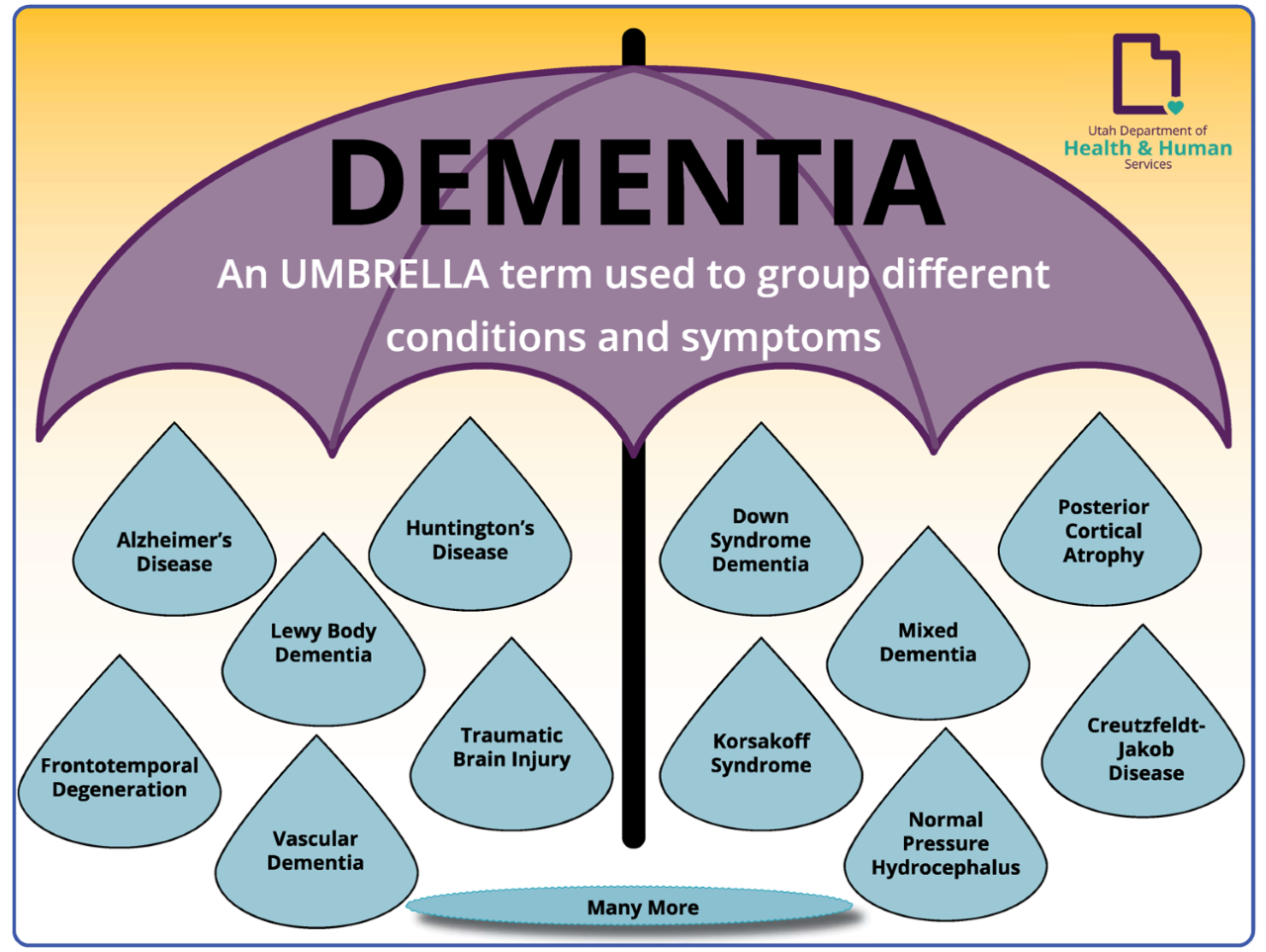Alzheimer's Disease and Related Dementias
Alzheimer's Disease and Related Dementias
Learn to Reduce your Risk of Dementia
Alzheimer’s disease is a brain disorder that slowly destroys memory and thinking skills, and eventually, the ability to carry out the simplest tasks. In most people with Alzheimer’s, symptoms first appear later in life. Estimates vary, but experts suggest that more than 6 million Americans, most of them age 65 or older, may have Alzheimer’s. Alzheimer’s is currently ranked as the seventh leading cause of death in the United States and is the most common cause of dementia among older adults.Dementia is the loss of cognitive functioning — thinking, remembering, and reasoning — and behavioral abilities to such an extent that it interferes with a person’s daily life and activities. Dementia ranges in severity from the mildest stage, when it is just beginning to affect a person’s functioning, to the most severe stage, when the person must depend completely on others for help with basic activities of daily living. (Attributed to NIH) On these page you will find the portal to a wide range of local and national resources, information, support groups, and the state plan for Utah to help disseminate these resources and provide professional training.
 What is the difference between Alzheimer's and Dementia?
What is the difference between Alzheimer's and Dementia?
Dementia is an "umbrella" term used to describe an individual's changes in memory, thinking or behavior.
Types of Dementias
Utah's Alzheimer's Disease and Related Dementias State Plan
Coordinating Council
Resources
International Association for Indigenous Aging
Embracing the cultural and spiritual values of Indigenous Communities.
Utah's collaborative research and resource center based at Utah State University in the Emma Eccles Jones College of Education and Human Services.
The premier source of information and support for Utahns living with Dementia.
A guide to help persons with dementia think about, document and share their preferences for their end-of-life care.
The Utah Department of Health and Human Services suggest utilizing the Mini-Cog as the first tool for screening. There are many options out there, here are a few evidence based options that may assist you in diagnosis along with articles that may be helpful.
Memory, Forgetfulness, and Aging: What's Normal and What's Not?
An explanation from the Institute on Aging about these differences
At this time, dementia cannot be cured. There are medications, treatments and strategies for symptoms that can be very helpful. Studies have show that individuals with dementia can live a happy, fulfilling life after diagnosis. There are promising medications such as Aduhelm that can treat Alzheimer's disease if caught early enough. We suggest you speak with your healthcare provider about questions or concerns regarding your memory, thinking, behaviors or treatments.
Articles on how to talk to your doctor about possible dementia symptoms.
eldercare.acl.gov "Elder Care Locator"
The best first step is to reach out to your local Area Agency on Aging (AAA). There is a Federal Caregiver Support Program that each of them offer. They will have the most up to date info for you! You can find the Utah AAAs on UtahAging.Org or find one anywhere in the US by visiting the Eldercare website.
Utah Statewide Education Calendar
training.alz.org "Education Center"
uclahealth.org "Caregiver Education"
alzheimers.gov "Caregiver Tips"
Tips, support group links, training videos, and webinars for caregivers.
alz.org "Public Policy Victories"
who.int "Dementia Policy and Legislation"
alzheimers.gov "Federal Commitment to Addressing Alzheimer's and Related Dementias"
astho.org "States Using Policy to Reduce Dementia's Disease and Fiscal Impact"
Websites that have updates on how the government is making dementia a priority.
Content Coming Soon...
Content Coming Soon...
Content Coming Soon...
Content Coming Soon...
Words and their explanations that often come up when talking about Dementia.
State, regional and local programs and services helping older adults remain healthy and independent.
Content Coming Soon...
Content Coming Soon...
news.northwestern.edu "Music Helps Patients With Dementia Connect With Loved Ones"
adrc.wisc.edu "The Powerful Benefits of Music on Memory Loss"
nhdementiatraining.org "Music & Memories; The Power of Music on the Brain"
brainandlife.org "How Music Affects Memory in Those with Dementia"
Articles that talk about ways music can help enrich the lives of those living with dementia.
Content Coming Soon...
Content Coming Soon...
12 Weeks to a Sharper You - Sanjay Gupta
Ways you can sharpen your brain and possibly prevent dementia.
Research and Education
Content Coming Soon...
